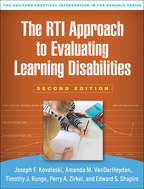The RTI Approach to Evaluating Learning Disabilities
Second Edition
Joseph F. Kovaleski, Amanda M. VanDerHeyden, Timothy J. Runge, Perry A. Zirkel, and Edward S. Shapiro
HardcoverPaperbacke-bookprint + e-book
Hardcover
orderOctober 26, 2022
ISBN 9781462550456
Price: $62.00 272 Pages
Size: 8" x 10½"
Paperback
orderNovember 29, 2022
ISBN 9781462550449
Price: $41.00 272 Pages
Size: 8" x 10½"
e-book
orderSeptember 14, 2022
PDF and Accessible ePub ?
Price: $41.00 272 Pages
ePub is Global Certified Accessible
print + e-book $82.00 $49.20
orderPaperback + e-Book (PDF and Accessible ePub) ?
Price: 272 Pages
ePub is Global Certified Accessible
The reproducible materials can be downloaded and printed in PDF format.
“This book accurately captures our evolving understanding of RTI within MTSS and clearly illustrates how to leverage the essential components of MTSS to identify significant learning disabilities. The second edition's additional focus on prevention—through the accurate use of screening data, appropriate instructional intensity, and effective Tier 1 core programming—will support school teams in effectively integrating special education requirements and promoting ambitious growth for students with disabilities. Professional learning providers and faculty will find the numerous case examples featuring commonly available assessments to be useful for modeling RTI decision making and facilitating robust discussions. Practitioners will find the decision-making flowcharts and implementation checklists invaluable for guiding efficient and effective implementation of RTI.”

—Tessie Bailey, PhD, Director, Center on Multi-Tiered System of Supports and PROGRESS Center, American Institutes for Research
“It is rare to see a book that is so grounded in research yet so practical, but Kovaleski et al. provide just such a resource. The second edition remains the most comprehensive book available on how to identify SLD in schools, and includes recent information about legal decisions, best practices for screening, and how to meet the classroom observation requirement so that it actually informs decisions. This book is a 'must read' for practitioners who are just beginning to use RTI for SLD identification, or for anyone working to have a more effective, legally defensible practice that improves children's lives. It is also a great text for school psychology training courses.”

—Matthew K. Burns, PhD, Rose and Irving Fein Endowed Professor of Special Education, University of Florida; Assistant Director, University of Florida Literacy Institute
“We referred to the first edition as our 'recipe book' for implementation of RTI-based SLD evaluation practices in North Carolina. The ingredients added to the second edition are spot-on and provide many needed details, including the critical role of the MTSS infrastructure, considerations for effective screening practices, and establishing the data requirements to rule out inadequate instruction as a cause for academic difficulties. I look forward to using the second edition in our statewide effort to scale evaluation and identification practices that begin with a focus on effective instruction for all.”

—Lynn Kalinoski Makor, MA, CAGS, Consultant for Psychological Services, North Carolina Department of Public Instruction
—Tessie Bailey, PhD, Director, Center on Multi-Tiered System of Supports and PROGRESS Center, American Institutes for Research
“It is rare to see a book that is so grounded in research yet so practical, but Kovaleski et al. provide just such a resource. The second edition remains the most comprehensive book available on how to identify SLD in schools, and includes recent information about legal decisions, best practices for screening, and how to meet the classroom observation requirement so that it actually informs decisions. This book is a 'must read' for practitioners who are just beginning to use RTI for SLD identification, or for anyone working to have a more effective, legally defensible practice that improves children's lives. It is also a great text for school psychology training courses.”
—Matthew K. Burns, PhD, Rose and Irving Fein Endowed Professor of Special Education, University of Florida; Assistant Director, University of Florida Literacy Institute
“We referred to the first edition as our 'recipe book' for implementation of RTI-based SLD evaluation practices in North Carolina. The ingredients added to the second edition are spot-on and provide many needed details, including the critical role of the MTSS infrastructure, considerations for effective screening practices, and establishing the data requirements to rule out inadequate instruction as a cause for academic difficulties. I look forward to using the second edition in our statewide effort to scale evaluation and identification practices that begin with a focus on effective instruction for all.”
—Lynn Kalinoski Makor, MA, CAGS, Consultant for Psychological Services, North Carolina Department of Public Instruction



